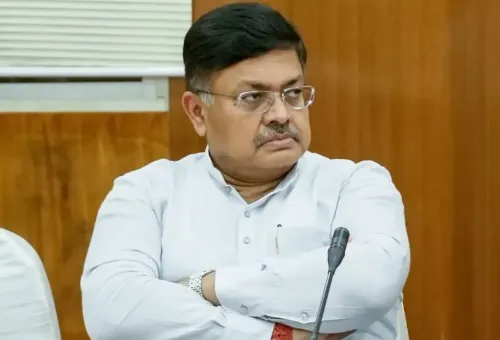Why Does BJP Oppose the Greater Bengaluru Authority?

Synopsis
Key Takeaways
- The BJP has opposed the Greater Bengaluru Governance Bill, citing constitutional violations.
- Local bodies may lose significant powers under the proposed legislation.
- Concerns have been raised about the centralization of authority in Bengaluru.
- Political leaders are divided on the Bill's implications for local governance.
- Public discussions and debates on this issue are ongoing.
Bengaluru, Aug 19 (NationPress) The Karnataka BJP has voiced its opposition to the Greater Bengaluru Governance (Amendment) Bill 2025, arguing that the legislation undermines the fundamental principles of the Indian Constitution.
Former Deputy Chief Minister and BJP MLA C.N. Ashwath Narayan expressed his concerns following the Bill's introduction in the Assembly on Tuesday, stating, “Local bodies operate according to the Constitution. The 73rd and 74th Amendments were instituted to safeguard their autonomy. Specifically, Section 243 of the 74th Amendment stipulates that there should be no interference. This Bill effectively centralizes all local body powers under the state government.”
He added, “The state government is diminishing the authority of corporators. They will be too preoccupied to manage their own duties. Interference will occur in development, management, and planning. The Constitution does not provide for the establishment of the Greater Bengaluru Authority (GBA).”
Ashwath Narayan emphasized, “The Chief Minister leads the state, and he also heads the GBA. This Bill strips local bodies of the freedom and empowerment they should possess. The Greater Bengaluru Governance Act is designed to meddle with local governance, which is evident.”
He insisted that local bodies must receive full autonomy in accordance with the 74th Amendment. “I urge the government to empower local bodies further and promote decentralization of authority. Local bodies lack the power to collect taxes. How can democracy thrive if the CM and Deputy CM interfere?” he questioned.
He appealed to Congress members, saying, “Many of you represent local bodies; safeguard their rights. If we fail to uphold Constitutional objectives, the judiciary may intervene and assume our responsibilities. Let’s avoid that scenario.”
Ashwath Narayan further questioned, “Why was the PIL filed against the GBA Act? What issues are raised? The Deputy CM, Shivakumar, should clarify.”
Leader of the Opposition R. Ashoka remarked, “I oppose the proposed name ‘Greater Bengaluru’. Isn’t there a better name in Kannada? Wasn’t ‘Bruhat Bengaluru Mahanagara Palike’ sufficient? Why opt for an English name? Mumbai has transformed into ‘Maha Mumbai’. Shivakumar is unfair to Kannada; remove ‘Greater’.”
He continued, “Moreover, the concept of decentralization has been compromised, and freedom has been eroded. The corporation should be autonomous, but it has been fragmented into five divisions. If one corporation generates good revenue, another may suffer. Financial resources will dwindle, placing them under government control.”
Ashoka added, “Former PM Rajiv Gandhi championed the 73rd Amendment, yet this Bill contradicts its objectives. What advantage does this Bill offer to Bengaluru residents? This is not a true decentralization of power. Since Deputy CM Shivakumar oversees Bengaluru, power is centralized. We oppose this. You may have the majority to pass it, but it’s not in society's best interest. Repeal this Bill.”
Congress MLA Rizwan Arshad stated, “This is merely a minor amendment for clarity. The government aims to prevent interference in city corporations' administration.”
In response to the backlash, Deputy CM D.K. Shivakumar remarked, “We need clarity on this issue. Bengaluru requires effective governance. Let’s deliberate for an entire day if necessary. Opposition members have more experience than us, and I’m open to their suggestions. If our draft has shortcomings, we’ll amend them. There’s no secrecy involved.”
“We even established a House Committee for transparent discussions. Let’s prioritize conducting elections. August 18 was the final date for objections, August 25 is the deadline for the Governor’s approval, and the final notification will be issued on September 2. We will also consider the opinions of opposition leaders.”









